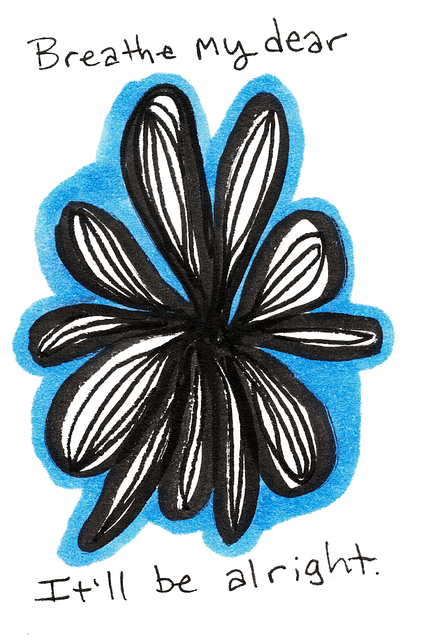Burnout among healthcare providers, marked by emotional exhaustion, depersonalization, and reduced personal accomplishment, is prevented by early recognition of signs like irritability and cynicism. Greenwood Village Crisis Counseling Therapy promotes a supportive work environment through open communication, self-care practices, and self-awareness exercises to minimize compassion fatigue. They advocate for stress management techniques such as mindfulness meditation and deep breathing, along with tailored coping strategies from specialized services, to combat burnout and enhance well-being in high-stress healthcare environments. Proactive holistic mental health care, including regular breaks and supportive networks, builds resilience against burnout risks while fostering sustainable careers.
Healthcare provider burnout is a growing concern, impacting not only individuals but also the quality of patient care. This article explores comprehensive strategies to prevent burnout among healthcare professionals, focusing on practices proven effective at Greenwood Village Crisis Counseling Therapy. We’ll delve into understanding burnout’s subtle signs and underlying causes, along with implementing stress management techniques and fostering resilience through self-care. Learn how these initiatives create a supportive work environment that nurtures well-being.
- Understanding Burnout Among Healthcare Providers: Signs and Causes
- Creating a Supportive Work Environment at Greenwood Village Crisis Counseling Therapy
- Implementing Effective Stress Management Techniques for Healthcare Professionals
- Fostering Resiliency and Self-Care Practices to Prevent Burnout
Understanding Burnout Among Healthcare Providers: Signs and Causes

Burnout among healthcare providers is a significant concern, impacting not only individual well-being but also patient care and overall system performance. It manifests as emotional exhaustion, depersonalization, and reduced personal accomplishment, often driven by high workload, lack of control, and unclear expectations. Recognizing burnout early is crucial, as it can lead to more severe consequences if left unaddressed.
Signs include increased irritability, cynicism towards patients or colleagues, decreased motivation, and difficulty concentrating. The causes are multifaceted, encompassing factors such as excessive working hours, heavy patient loads, complex decision-making, and insufficient support systems. Cultural Sensitivity in Mental Healthcare Practice plays a vital role in addressing burnout, ensuring providers feel valued and respected. Additionally, designing effective Mental Health Education Programs can equip healthcare professionals with coping strategies. Public Awareness Campaigns Development can also help reduce the stigma surrounding mental health issues, encouraging open dialogue and seeking support before burnout becomes severe.
Creating a Supportive Work Environment at Greenwood Village Crisis Counseling Therapy

At Greenwood Village Crisis Counseling Therapy, we understand that creating a supportive work environment is paramount to preventing burnout among our healthcare providers. This involves fostering a culture where open communication and self-care practices are not just encouraged but integrated into daily operations. Our therapists regularly engage in self-awareness exercises designed to maintain emotional balance and prevent compassion fatigue.
By promoting robust communication strategies among team members, we ensure that everyone feels heard and valued. This collective support system helps in managing stress levels and promotes a sense of belonging, reducing the risk of burnout. Greenwood Village Crisis Counseling Therapy’s commitment to these practices underscores our dedication to providing exceptional care while safeguarding the well-being of our dedicated professionals.
Implementing Effective Stress Management Techniques for Healthcare Professionals

Healthcare professionals often face high-stress environments, leading to burnout if left unaddressed. Implementing effective stress management techniques is a proactive approach to counteract this issue. Strategies such as mindfulness meditation and deep breathing exercises can help healthcare workers maintain emotional regulation in challenging situations. Regular practice of these methods has been shown to significantly boost confidence and improve mood management, enabling professionals to navigate demanding work environments with greater resilience.
In cases where stress becomes overwhelming, seeking support from specialized services like Greenwood Village Crisis Counseling Therapy can be immensely beneficial. These therapies offer tailored strategies for coping with workplace pressures, fostering a healthier mental state, and enhancing overall well-being. By incorporating such practices into their routines, healthcare professionals can prevent burnout and provide better care for their patients.
Fostering Resiliency and Self-Care Practices to Prevent Burnout

In the face of escalating demands and emotional strain, healthcare providers must prioritize fostering resilience and adopting self-care practices to prevent burnout. Greenwood Village Crisis Counseling Therapy emphasizes Mind Over Matter Principles, focusing on mental health policy analysis and advocacy as key components of a holistic approach. By integrating strategies that promote Self-Esteem Improvement, professionals can enhance their ability to navigate challenging situations, leading to better patient outcomes and improved job satisfaction.
This proactive stance involves scheduling regular breaks, engaging in stress-reducing activities, and cultivating supportive professional networks. Additionally, seeking therapy or counseling services, similar to those offered by Greenwood Village Crisis Counseling Therapy, can provide valuable outlets for processing complex emotions and refining coping mechanisms. Through these practices, healthcare providers not only mitigate the risks of burnout but also cultivate a more sustainable and fulfilling career in their chosen field.
Healthcare provider burnout is a pressing issue, but by implementing strategies like those championed by Greenwood Village Crisis Counseling Therapy—from fostering supportive work environments and effective stress management techniques to encouraging resilience and self-care—we can create lasting change. These measures not only mitigate burnout but also enhance the quality of care delivered to patients. Through collective efforts, we can prevent professional exhaustion and ensure healthcare professionals thrive in their essential roles.














